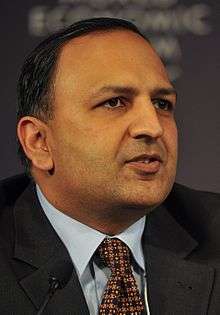Pratap Bhanu Mehta
| Pratap Bhanu Mehta | |
|---|---|
 Mehta speaking at the World Economic Forum's India Economic Summit 2009 | |
| Born | 1967 |
| Residence | India |
| Nationality | Indian |
| Alma mater |
St John's College, Oxford Princeton University |
| Scientific career | |
| Fields | Political Science |
| Institutions | Vice-Chancellor of Ashoka University |
Pratap Bhanu Mehta (born 1967) is an Indian academic. He was the president of the Centre for Policy Research, a New Delhi-based think tank.[1] The Centre for Policy Research is one of India’s most distinguished think tanks. He was a Professor at NYU Law School’s Global Faculty. He has previously been Visiting Professor of Government at Harvard University; Associate Professor of Government and of Social Studies at Harvard, and for a brief period, Professor of Philosophy and of Law and Governance at Jawaharlal Nehru University. He became the Vice-Chancellor of Ashoka University on 1 July 2017.[2] He has been described as "one of India’s more thoughtful intellectuals."[3]
Early life
Pratap was born in Jodhpur.[4] His initial schooling was at the St. Edwards School in Shimla and St. Xaviers, Jaipur.[5] Mehta obtained a B.A. from St John's College, Oxford in Philosophy, Politics and Economics (PPE) and a Ph.D in Politics from Princeton University.
Career
Mehta has also done extensive public policy work. He was Member-Convenor of the Prime Minister of India's National Knowledge Commission; Member of the Supreme Court appointed Lyngdoh Committee on Indian Universities and has contributed to a number of reports for leading Government of India and International Agencies. He was on the Board of Governors of IDRC. He was Vice-Chair of the World Economic Forum's Council on Global Governance. He has also served on the Board of NIPFP, NCAER and NIID. He is also on the Editorial Board of numerous journals including the American Political Science Review and Journal of Democracy.
Mehta has published widely in the fields of political theory, intellectual history, constitutional law,[6] politics and society in India and international politics.[7] His scholarly articles have appeared in leading international referred journals in the field, as well as numerous edited volumes. His early work was on eighteenth century thought, particularly on Adam Smith and the Making of the Enlightenment.[8] He has also written on issues of Cosmopolitanism, Liberalism, Rights, Judicial Review, International Governance and Democratic Theory.
Controversies
Mehta resigned from the National Knowledge Commission in protest against the UPA government's Higher Education Policies.[9]
Selected works
- The Oxford Companion to Indian Constitution, edited with Madhav Khosla and Sujit Choudhary, Oxford University Press
- Shaping the Emerging World: India and the Multilateral Order (ed. with W. P. Sidhu and Bruce Jones) Brookings, 2013
- Non Alignment 2.0 (with Sunil Khilnani et al.) Penguin (2013)
- The Oxford Companion to Politics in India edited by Niraja Jayal & Pratap Bhanu Mehta, Oxford University Press
- Public Institutions in India: Performance and Design edited by Devesh Kapur & Pratap Bhanu Mehta, Oxford University Press (2005)
- The Burden of Democracy by Pratap Bhanu Mehta, Penguin (2003)
References
- ↑ http://www.livemint.com/2010/06/01133052/Swaminathan-Anu-Aga-among-new.html
- ↑ "Pratap Bhanu Mehta to leave CPR, join Ashoka University as vice chancellor". Live Mint.
- ↑ Max Rodenbeck (22 July 2017). "Why India and Pakistan hate each other". The Economist. Retrieved 26 July 2017.
- ↑ "Tyranny of identity by decree".
- ↑ "Eastward Bound". Face to Face magazine. 1 February 2012. Retrieved 18 January 2018.
- ↑ "Small step, no giant leap".
- ↑ "Lingayat leap of faith".
- ↑ Mehta, Pratap Bhanu. The Natural Career of the Imagination: Themes in Adam Smith's Moral and Political Philosophy. PhD dissertation, Princeton University, June 1994; cited in The Enlightenment of Sympathy: Justice and the Moral Sentiments In The Eighteenth Century And Today,2010, by Michael L. Frazer and "Self-Interest and Other Interests” The Cambridge Companion on Adam Smith, cited in “Adam Smith’s System of Natural Liberty and the Gravitational force of the Self-interest Socially Understood”, paper by Fabio Monsalve, 15th Annual Conference of the European Society for the History of Economic Thought (ESHET), Istanbul, 2011, http://www.uclm.es/dep/daef/DOCUMENTOS%20DE%20TRABAJO/DT-2011/2011-2%20DT-DAEF.pdf; http://scholar.googleusercontent.com/scholar?q=cache:FwqjeEnTWBYJ:scholar.google.com/&hl=en&as_sdt=0,38; Hukum Ham Internasional 2010 by Pranoto Iskandar of the Institute of Migrant Rights, The Science of Wealth: Adam Smith and the Framing of Political Economy, 2009, by Tony Aspromourgos. Other Works:Mehta, Pratap B. “Liberalism, Nation, and Empire: The Case of JS Mill”. paper presented at the American Political Science Association, 1996; cited in A Turn to Empire: The Rise of Imperial Liberalism in Britain and France , 2005 by Jennifer Pitts and “After Colonialism : The Impossibility of Self- Determination” in Colonialism and Its Legacies, 2011, by Jacob Levy
- ↑ http://archive.indianexpress.com/news/dear-prime-minister/4916/
External links
| Wikimedia Commons has media related to Pratap Bhanu Mehta. |